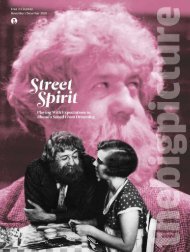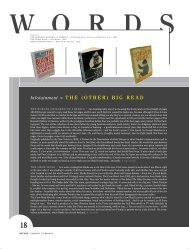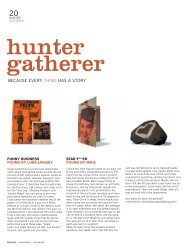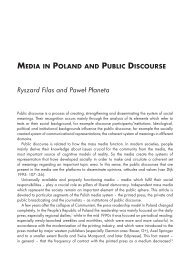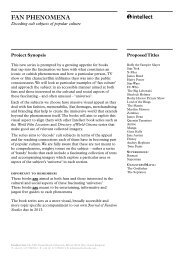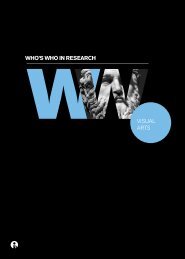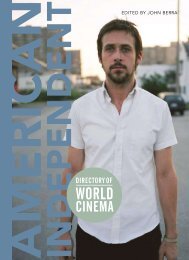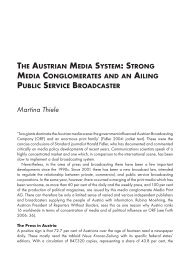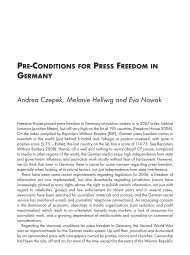Anthem - Intellect
Anthem - Intellect
Anthem - Intellect
You also want an ePaper? Increase the reach of your titles
YUMPU automatically turns print PDFs into web optimized ePapers that Google loves.
<strong>Anthem</strong><br />
degrees of acceptance. The original French lyrics of the Belgian ‘La Brabançonne’<br />
(The Song of Brabant) from 1830 has continuously been revised to avoid anti-Dutch<br />
elements, and of course also has a version in Flemish. Given the internal tensions<br />
between the Vallonians and the Flemish, it is no surprise that the lyrics have no<br />
official status, but still the song is actually used in practice. Finland’s ‘Maamme/Vårt<br />
land’ (Our Land) from 1848 was written in Swedish but has a Finnish translation.<br />
It is again not officially legislated but used in practice. Switzerland’s official anthem<br />
‘Schweizerpsalm’ from 1841 has its text in all four official national languages, that<br />
is, translated from the German original to French, Italian and Romansch. Only the<br />
Spanish ‘Marcha Real’ (Royal March), going back to the mid-eighteenth century, is<br />
mostly performed without words, and its link to the royalty makes it problematic for<br />
semi-autonomous regions like Catalunya and the Basque countries. In Kosovo, the<br />
European anthem is also often played, as an act of respect for EU’s role in assisting the<br />
process of national independence. Since 2008 it has a conventional national anthem<br />
named ‘Europe’ that has no lyrics, in order to avoid discrimination of any of its ethnic<br />
groups, while neighbouring Bosnia and Herzegovina has chosen to have an anthem<br />
with lyrics available in both Bosnian and Serbian language.<br />
There is no officially established anthem for the whole of Asia, North or South<br />
America, but the African Union has in 2010 adopted an official African Union anthem,<br />
‘Let Us All Unite and Celebrate Together’. 424 It is on various websites played by a wind<br />
orchestra in a classical European-French slow military march style, but there is also a<br />
set of lyrics presented both in English and in French:<br />
Let us all unite and celebrate together<br />
The victories won for our liberation<br />
Let us dedicate ourselves to rise together<br />
To defend our liberty and unity<br />
O Sons and Daughters of Africa<br />
Flesh of the Sun and Flesh of the Sky<br />
Let us make Africa the Tree of Life<br />
The next verses speak of joint singing for fighting together ‘for lasting peace and<br />
justice on earth’ and of joint working for Africa as ‘the cradle of mankind and fount of<br />
culture’. The tune thus seamlessly inscribes itself in the European anthemic tradition,<br />
but the lyrics recontextualise it into a postcolonial context. Africa is not so much<br />
elevated to a supreme position (as is the case with Europe) but rather described in<br />
terms of roots and origins of mankind and culture, with political liberation, cultural<br />
creativity and unbroken ties to nature as main values, and with a union seemingly<br />
(and unrealistically!) unthreatened by any internal divides.<br />
183



